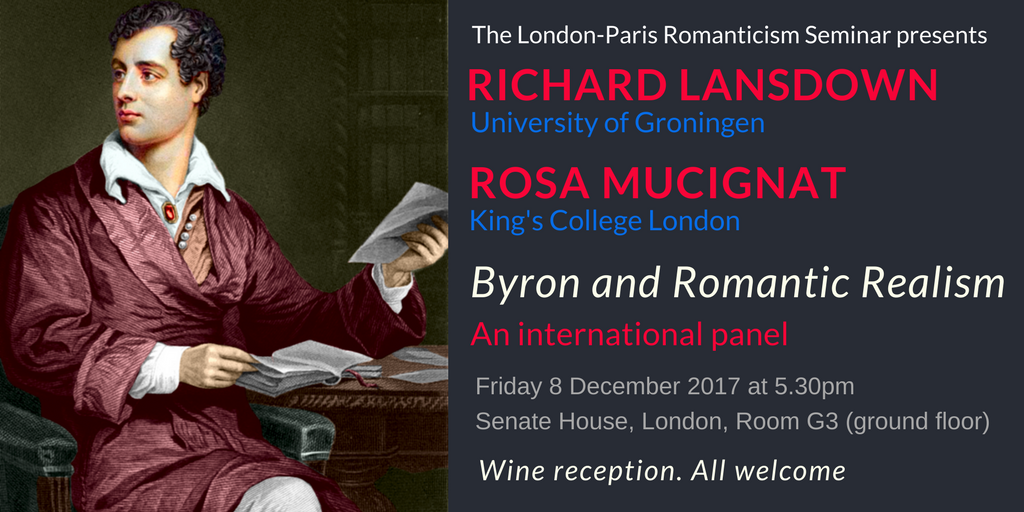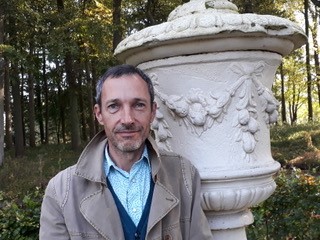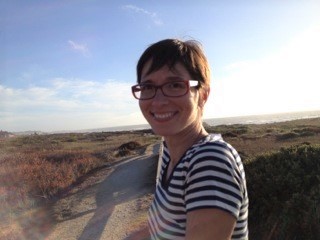
The next meeting of the London-Paris Romanticism Seminar will take place on Friday 8 December 2017 and feature an international panel on Byron and Romantic Realism. As our guest speakers, we are delighted to welcome Richard Lansdown, Professor of Modern English Literature and Culture at the University of Groningen, whose paper is entitled Novelistic Realism in the English Cantos of Don Juan, and Rosa Mucignat, Senior Lecturer in Comparative Literature at King’s College London, whose topic is Byron and Realist Time-Space: Metonymy and the Chronotope in Childe Harold Canto IV. Abstracts appear below.
The seminar will be held in Senate House, University of London, Room G3 (ground floor), starting at 5.30. The papers will be followed by a discussion and a wine reception, to which everyone is invited, including postgraduates and members of the public. Admission is free.
 Richard Lansdown is Professor of Modern English Literature and Culture at the University of Groningen; before that he taught for 25 years in Australia, mostly in the tropics. He is the author of studies of Byron with both Oxford and Cambridge University Presses (1992 and 2012), and the editor of a new selection from the poet’s letters and journals with the former (2015). He has also written on Wordsworth and Austen, and is the author of A New Scene of Thought: Studies in Romantic Realism (Brill-Rodopi 2017). He has published connected studies on matters literary-theoretical: The Autonomy of Literature (Macmillan 2000) and Literature and Truth: Imaginative Writing as a Medium for Ideas (Brill-Rodopi 2017). This diversity of interest is reflected in Strangers in the South Seas: The Idea of the Pacific in Western Thought (University of Hawaii Press 2006), and some recent articles from Berlioz and Delacroix to James Kelman, and Thomas Hardy to Bronislaw Malinowski.
Richard Lansdown is Professor of Modern English Literature and Culture at the University of Groningen; before that he taught for 25 years in Australia, mostly in the tropics. He is the author of studies of Byron with both Oxford and Cambridge University Presses (1992 and 2012), and the editor of a new selection from the poet’s letters and journals with the former (2015). He has also written on Wordsworth and Austen, and is the author of A New Scene of Thought: Studies in Romantic Realism (Brill-Rodopi 2017). He has published connected studies on matters literary-theoretical: The Autonomy of Literature (Macmillan 2000) and Literature and Truth: Imaginative Writing as a Medium for Ideas (Brill-Rodopi 2017). This diversity of interest is reflected in Strangers in the South Seas: The Idea of the Pacific in Western Thought (University of Hawaii Press 2006), and some recent articles from Berlioz and Delacroix to James Kelman, and Thomas Hardy to Bronislaw Malinowski.

Rosa Mucignat is Senior Lecturer in Comparative Literature at King’s College London. She is the author of Realism and Space in the Novel, 1795-1869 (Ashgate, 2013), and has published articles on space and place in European and world literature from the eighteenth century to the present. Her current research interests are twofold: representations of Italianness in literature and historiography of the Romantic period; and the experience of modernity in literatures in minor and endangered languages. She has written on Pier Paolo Pasolini and Friuli, and has edited the collection of essay Friulian Language: Identity, Migration, Culture (2014). She is a member of the Leverhulme-funded research network ‘Landscapes of Realism’, which is working towards a multi-authored volume on Realism in literatures in the European languages.
ABSTRACTS
Novelistic Realism in the English Cantos of Don Juan
Romantic literature is often seen to be an ‘idealistic’, noumenous, or exclusively ‘imaginative’ phenomenon: much taken up with intellectual essences and aspirations beyond the everyday. This paper asks readers to see the other side of the coin: the role Romantic literature played in the development of realism (defined in terms both aesthetic and ethical) in the early nineteenth century. One of Byron’s contributions to that development involves his depiction of country-house life in the English cantos of his brilliant epic — which is highly novelistic in any case. In particular, Norman Abbey contains a set of art-objects which have a specific historical-cum-psychological presence and status, anticipating similar objects in Victorian fiction. Richard Lansdown
Byron and Realist Time-Space: Metonymy and the Chronotope in Childe Harold Canto IV
The final canto of Childe Harold’s Pilgrimage has often been read as Byron’s most intense engagement with problems and ideas that we might align with realism as a critical category. For Stephen Cheeke, Canto IV reflects on ’the very process of bringing creative thought to bear upon the “things” of the world’ (Byron and Place, 97). Jerome McGann argued that in it Byron ‘confront[s] the hypocrisies of Romantic imagination’ (Byron and Romanticism, 157). While previous approaches have considered the impact of extratextual phenomena (respectively geo-historical accuracy and personal ‘sincerity’), this paper aims at verifying the realism of Canto IV on a different basis, focusing on the specific discursive strategies that characterize Byron’s representation of time and space. To do so, it mobilizes two influential theories of realism in ‘verbal art’: Jakobson’s analysis of the different linguistic operations governing poetry and prose, which posits metonymy as the hallmark of realism, and Bakhtin’s notion of the chronotope, or the embedding of narrative in a concrete spatio-temporal world. Rosa Mucignat
One thought on “London-Paris Romanticism Seminar: Byron and Romantic Realism, Friday 8 December 2017, Senate House, London”
Comments are closed.